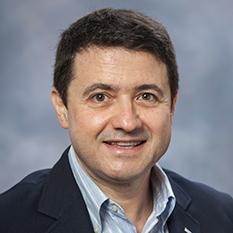 Leandros Tassiulas
Leandros Tassiulas
Yale University
Title: Collaborative information caching at the network edge
The proliferation of computing, storage and communication resources throughout the network are gradually transforming the internet into a virtual machine for service provisioning at all levels.
The availability of abundant storage capacity at the network periphery and inside the network, in addition to the backend, motivates novel approaches to improve network throughput and performance while at the same
time raises the user quality of experience towards the levels projected by 5G wireless edge networks. The key technical issues in emerging caching architectures relate to the following questions: where to install caches,
what content and for how long to cache, how often to update and how to manage the routing of content within the network. In this talk, an overview is provided, starting with generic architectures that can be applied to
different networking environments, and moving to emerging architectures that enable caching in wireless networks (e.g., at cellular base stations and WiFi access points). Novel challenges arise in the latter due to the
inadequacy of wireless resources and their broadcast nature, the frequent hand-offs between different cells for mobile users, as well as the specific requirements of different types of user applications, such as video
streaming. We will present our recent results on innovative caching approaches that (i) harvest idle user-owned cache space and bandwidth, (ii) leverage the broadcast nature of the wireless medium to serve concurrent
requests for content (iii) exploit the regularity of user mobility patterns, (iv) apply advanced video encoding techniques to support multiple video qualities (e.g., screen sizes, frame rates, or signal-to-noise ratio (SNR)
qualities) and finally (v) leverage multicast nature of information delivery.
Bio
Leandros Tassiulas is the John C. Malone Professor of Electrical Engineering at Yale University. His research interests are in the field of computer and communication networks with emphasis on fundamental mathematical models and algorithms of complex networks, architectures and protocols of wireless systems, sensor networks, novel internet architectures and experimental platforms for network research. His most notable contributions include the max-weight scheduling algorithm and the back-pressure network control policy, opportunistic scheduling in wireless, the maximum lifetime approach for wireless network energy management, and the consideration of joint access control and antenna transmission management in multiple antenna wireless systems. Dr. Tassiulas is a Fellow of IEEE (2007). His research has been recognized by several awards including the IEEE Koji Kobayashi computer and communications award (2016), the inaugural INFOCOM 2007 Achievement Award “for fundamental contributions to resource allocation in communication networks,” several best paper awards including the INFOCOM 1994, 2017 and Mobihoc 2016, a National Science Foundation (NSF) Research Initiation Award (1992), an NSF CAREER Award (1995), an Office of Naval Research Young Investigator Award (1997) and a Bodossaki Foundation award (1999). He holds a Ph.D. in Electrical Engineering from the University of Maryland, College Park (1991). He has held faculty positions at Polytechnic University, New York, University of Maryland, College Park, University of Ioannina and University of Thessaly, Greece.

